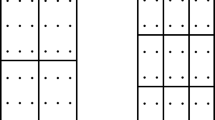Abstract
To denote a (3,1,2)-conjugate orthogonal idempotent latin square of order n, the usual acronym is (3,1,2)-COILS(n). Up to now, existence of a (3,1,2)-COILS(n) had been proved for every positive integer n except n = 2, 3, 4, 6, for which the problem was answered in the negative, and n = 10, for which it remained open. In this paper, we use a computer program to prove that a (3,1,2)-COILS(10) does not exist. Following along the lines of recent studies which led to the solution, by means of computer programs, of many open latin square problems, we use a constraint satisfaction technique combining an economical representation of (3,1,2)-COILS with a drastic reduction of the search space. In this way, resolution time is improved by a ratio of 104, as compared with current computer programs. Thanks to this improvement in performance, we are able to prove the non-existence of a (3,1,2)-COILS(10).
This work was supported by Advanced Micro Devices Inc.
Access this chapter
Tax calculation will be finalised at checkout
Purchases are for personal use only
Preview
Unable to display preview. Download preview PDF.
Similar content being viewed by others
References
Bennett, F., Zhu, L.: Conjugate-orthogonal Latin squares and related structures. In: J. H. Dinitz & D. R. Stinson (eds): Contemporary Design Theory: A Collection of Surveys. John Willey & Sons 1992
Freeman, J. W.: Hard random 3-SAT Problems and the Davis-Putnam Procedure. Artificial Intelligence 81, no 1–2, (1996) 183–198
Fujita, H., Hasegawa, R.: A Model Generation Theorem Prover in KL1 Using Ramified-Stack Algorithm. In: Proc. of ICLP-91 (1991) 535–548
Fujita, M., Hasegawa, R., Koshimura, M., Fujita, H.: Model Generation Theorem Provers on A Parallel Inference Machine. In: Proc. of FGCS-92 (1992)
Fujita, M., Slaney, J., Bennett, F.: Automatic generation of some results in finite algebra. In: Proc. of Int. Joint Conference on Artificial Intelligence (1993) 52–57
Lam, C. W. H., Thiel, L., Swierck, S.: The non-existence of Finite Projective Planes of Order 10. Canadian Journal of Mathematics (1989) 1117–1123
McCune, W.: OTTER 2.0. In: Proc. of CADE-10 (1990) 663–664
Slaney, J.: FINDER: Finite Domain Enumerator. In: Version 3.0Notes and Guide (1993) 1–22
Slaney, J., Fujita, M., Stickel, M.: Automated reasoning and exhaustive search: Quasigroup existence problems. In: Computers and Mathematics with Applications (1995) 115–132
Stickel, M., Zhang, H.: First results of studying quasigroup identities by rewriting techniques. In: Proc. of Workshop on Automated Theorem Proving (1994)
Stickel, M. E.: A Prolog Technology Theorem Prover: Implementation by an Extended Prolog Compiler. Journal of Automated Reasoning (1998) 353–380
Zhang, H.: SATO: A decision procedure for propositional logic. Association for Automated Reasoning Newsletter (1993) 1–3
Zhang, H: Specifying Latin squares in propositional logic. In: Association for Automated reasoning Newsletter, Essays in honor of Larry Wos, Chapter 6,. MIT Press 1997
Zhang, H., Bonacina, M. P., Hsiang H.: PSATO: a distributed propositional prover and its application to quasigroup problems. Journal of Symbolic Computation (1996) 543–560
Zhang, H., Stickel, M.: Implementing the Davis-Putnam Method. Journal of Automated Reasonning 24, no 1/2 (2000) 277–296
Zhang, J.: Constructing finite algebras with FALCON. Journal of Automated Reasoning (1996) 1–22
Zhang, J., Zhang, H.: SEM: a System for enumerating Models. In: Proc. of International Joint Conference on Artificial Intelligence (1995) 11–18
Author information
Authors and Affiliations
Editor information
Editors and Affiliations
Rights and permissions
Copyright information
© 2001 Springer-Verlag Berlin Heidelberg
About this paper
Cite this paper
Dubois, O., Dequen, G. (2001). The Non-existence of (3,1,2)-Conjugate Orthogonal Idempotent Latin Square of Order 10. In: Walsh, T. (eds) Principles and Practice of Constraint Programming — CP 2001. CP 2001. Lecture Notes in Computer Science, vol 2239. Springer, Berlin, Heidelberg. https://doi.org/10.1007/3-540-45578-7_8
Download citation
DOI: https://doi.org/10.1007/3-540-45578-7_8
Published:
Publisher Name: Springer, Berlin, Heidelberg
Print ISBN: 978-3-540-42863-3
Online ISBN: 978-3-540-45578-3
eBook Packages: Springer Book Archive




